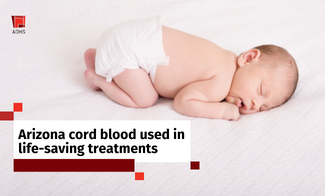 Today, Nov. 15, is World Cord Blood Day, which calls attention to how stem cells that remain in the placenta and umbilical cord after a child is born help doctors treat more than 80 life-threatening diseases.
Today, Nov. 15, is World Cord Blood Day, which calls attention to how stem cells that remain in the placenta and umbilical cord after a child is born help doctors treat more than 80 life-threatening diseases.
There have been more than 40,000 cord blood stem cell transplants since a French doctor first used the procedure in 1988. The collection process occurs after the baby is born and poses no risks to the mother or baby.
Cord blood stem cells are currently used to treat diseases including leukemia, lymphoma, and sickle cell anemia. Cord blood stem cells are also proving critical to new areas of regenerative medicine to potentially treat spinal cord injuries, cerebral palsy, autism, Type 1 diabetes, and much more.
The Arizona Public Cord Blood Program was created in 2011 to advance the collection of cord blood and increase the number of units available for transplantation. Since the program’s inception, 81 cord blood units from Arizona donations have been used for life-saving treatments. Participating hospitals include Dignity Health (St. Joseph’s Hospital and Medical Center in Phoenix and Chandler Regional Medical Center), Valleywise Health Medical Center, and Tucson Medical Center.
Cord blood is processed and stored by MD Anderson Cord Blood Bank at the University of Texas in Houston. The nonprofit Save The Cord Foundation, based in Tucson, provides non-commercial education, information, and cord blood-banking resources to expectant parents and the public for saving umbilical cord blood stem cells via public donation or private banking.
More information on cord blood is available from the Arizona Biomedical Research Centre. And you can learn more about World Cord Blood Day 2022 at WorldCordBloodDay.org.










